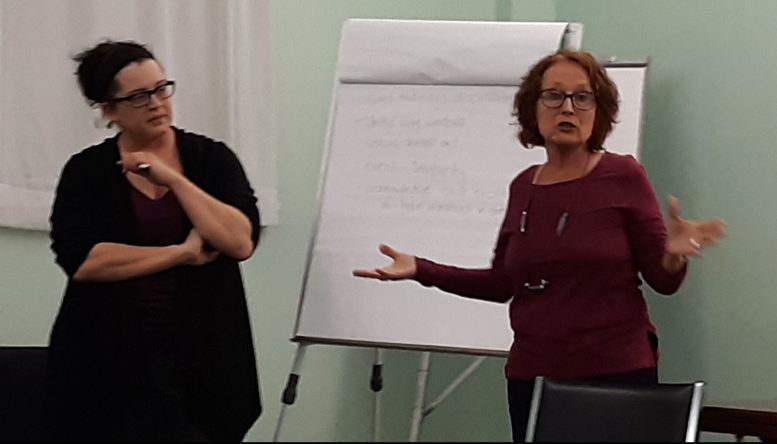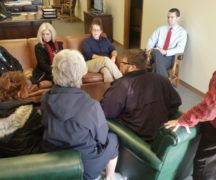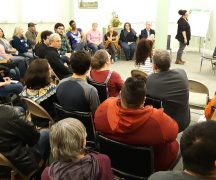By JAN LARSON McLAUGHLIN
BG Independent News
Bowling Green City Council got mixed messages last week on the city’s efforts to prevent acts of hate and discrimination.
On one side were La Conexion members, who feel the city is missing an opportunity to protect citizens from discrimination. On the other side was a man who said America is not racist, and the regulations proposed in the anti-discrimination ordinance have “no place in America.”
In the middle are City Council members, who have expressed a desire to strengthen the city’s anti-discrimination codes – but are being careful to not go further than the law allows them.
At issue is one provision requested by La Conexion that would require businesses to train their employees on anti-discrimination policies – or be liable if they don’t. The request came about after two teenage customers of color were beat up by two white men at the Waffle House in Bowling Green in 2019.
Working with La Conexion, Bowling Green City Council President Mark Hollenbaugh introduced changes to the city’s anti-discrimination ordinances – but stopped short of requiring businesses to train their employees. The training is already being offered free of charge by the Bowling Green Police Division, but the city cannot require businesses to send their employees, Hollenbaugh said.
Members of La Conexion were back in front of City Council last week, talking about the value of bystander training.
Emily Dunipace, a co-chairperson of Not In Our Town Bowling Green, said there are “safe and effective” ways for observers to respond when they see acts of hate and discrimination. “It’s a reasonable request to ask our businesses,” she said.
“We all need to do more than the status quo” to become a truly safe, welcoming and inclusive community, Dunipace said.
“City Council has an opportunity to make a strong and meaningful change,” she said. “Send a strong message in our town that we do not tolerate acts of discrimination or hate.”
Council member Sandy Rowland explained that she supports La Conexion.
“But I am very concerned about what you are asking council to do,” she said. “We cannot require that businesses send every employee to training.”
Amanda Schackow, of La Conexion, thanked City Council for being willing to adopt three provisions suggested by La Conexion – but asked them to please consider one more – on the employee training.
Schackow suggested that businesses should be held accountable if they fail to take reasonable steps to prevent hate or discriminatory acts.
“We know you guys can receive backlash from businesses,” she said. But she asked City Council to find a solution that makes sense.
“We would like to see something tougher,” Schackow said.
But Rowland repeated her concerns.
“Our hands are really tied to do what you are asking us at this point,” she said. “This is not a simple request.”
Three other changes suggested by La Conexion had their second reading last week to become part of the city’s anti-discrimination ordinances that were initally approved by city voters a decade ago. The changes included are:
- Adding ethnicity, source of income, and immigration status as new protected classes to the existing code.
- Including the concept of “actual” and “perceived” classes, as many discrimination incidents are based on perceptions.
- Improving accountability and transparency in the reporting system by establishing a panel to accept and handle complaints. The panel expands this system from the city administrator to also include an elected member of City Council, as well as the president of the Human Relations Commission (or their designee).
But one citizen at last week’s council meeting said Bowling Green does not need to take such steps.
“Bowling Green does not have a racism problem,” off-duty police officer Paul Tyson said in a letter he read to City Council. “We have an identity politics problem: People using race as a cudgel to gain power and force a meritless agenda on unwilling free citizens, resulting in a continuing erosion of our God-given rights.”
Tyson said the “Waffle House incident” is being used as a tool to claim Bowling Green needs to be more inclusive.
He said some key facts have been omitted from the story that has been presented to the public. Tyson said some witnesses at the Waffle House told investigators that the victims were using racial slurs toward the accused.
Both defendants did, however, plead guilty to felonious assault and ethnic intimidation last year. And restaurant employees told investigators that the victims did nothing to prompt the assault.
But Tyson said “inaccurate representation and incomplete presentation of this incident is misleading the public to gain fraudulent support to make a very bad addition to current law.”
Tyson objected to the request for businesses to train their employees, saying, “let them have their freedom.” He also opposed the provision supported by City Council that establishes a panel to hear complaints about discrimination.
The change “adds a government tribunal to preside over hearings of private citizens and pass judgment determining if the citizen behaved in a moral and ethical manner according to a government standard,” Tyson said. “This has no place in America.”





